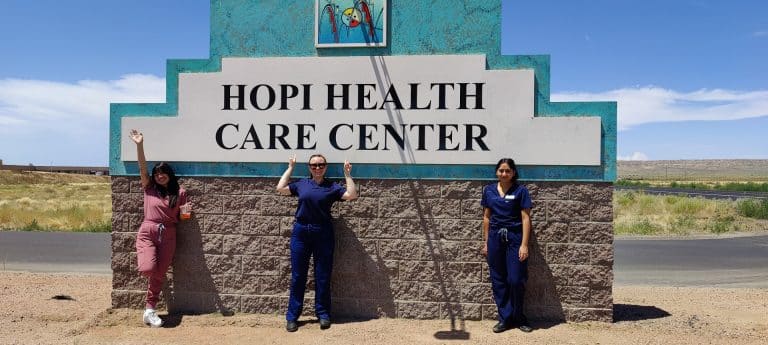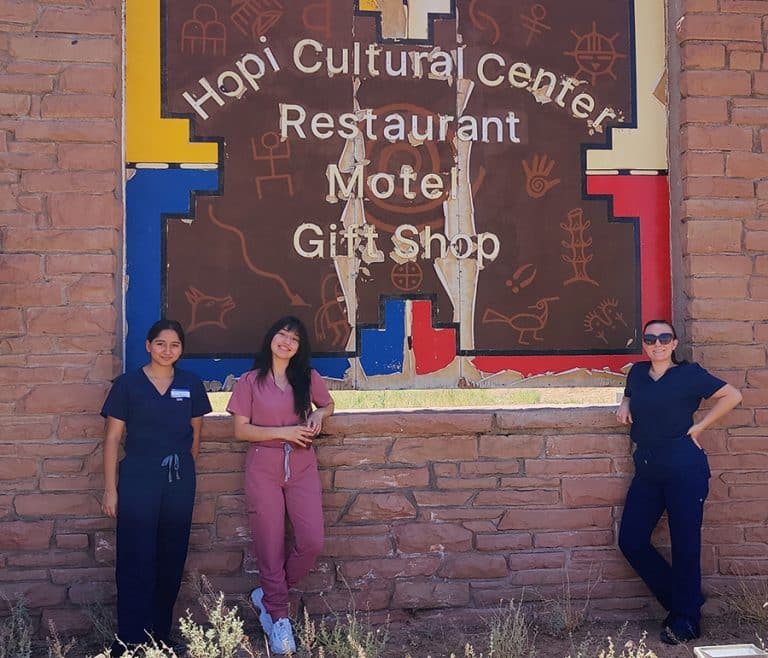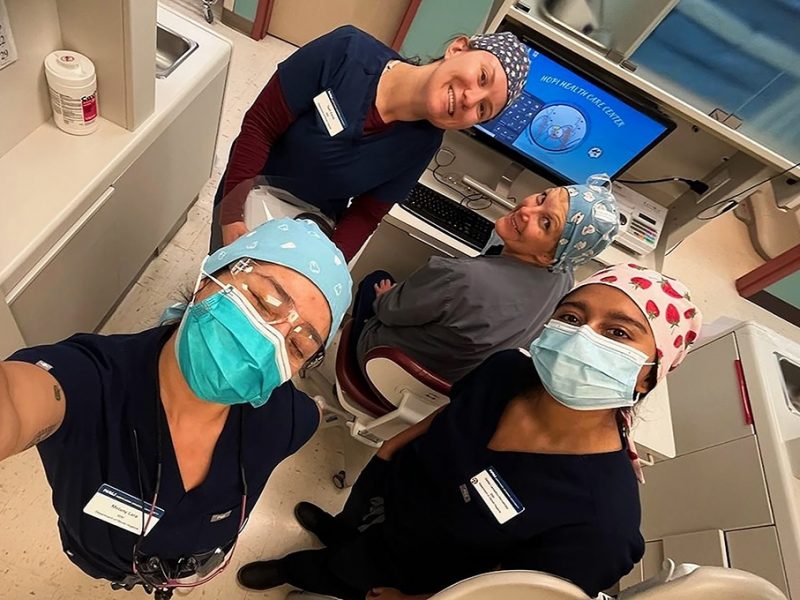Out of the classroom: Dental hygiene students gain experience at Hopi Health Center
In the heart of the Hopi Reservation in northern Arizona, a small group of dedicated NAU dental hygiene students find their way back to a cozy trailer where they enjoy necessary downtime after a long day of treating patients. Some unwind with television, while others stargaze. These students are participating in the Hopi Summer Externship, a two-week program that aims to tackle dental care inequity.
Throughout the country, millions of Native Americans experience dental care shortages, including those on the Hopi Reservation to the northeast of Flagstaff. Northern Arizona University, which sits on homeland sacred to Native Americans and has a commitment to Indigenous success, has been working to address this issue. Since 2003, the Department of Dental Hygiene has sent students and faculty to the Hopi Reservation in hopes of bridging the gap in dental care through a clinical rotation and summer externship, while teaching the future generation of hygienists.

The program began under the leadership of dental hygiene professor Denise Helm and began as a collaboration between the new (at the time) Hopi Health Care Center led by Daryl Melvin, the John and Sophie Ottens Foundation, Indian Health Services, and the NAU Dental Hygiene Department.
The Ottens Foundation, led by Henry Hooper, had a mission to improve the health of Native Americans. Melvin, a Hopi tribal member and the CEO of the Hopi Health Center, had a vision to provide comprehensive healthcare that included oral health services to the people living in Polacca and the surrounding villages. The Dental Hygiene Department saw the need for students to gain experience with other cultures and learn more about public health. These shared passions led to the development of a common vision for a rotation and externship in which students live and provide dental hygiene services on the Hopi Reservation.
With continued support from the John and Sophie Ottens Foundation and the College of Health and Human Services, students work under local dentists at the Hopi Health Care Center where there are no dental hygienists on site. The NAU dental hygiene students fill the gap by completing thorough cleanings and exams for patients. The program has been ongoing since it started in 2003, until 2020, when the COVID-19 pandemic brought it to a halt. In fact, dental care throughout Hopi closed for approximately two-and-a-half years to protect patients from contracting the coronavirus but deprived the community of important dental care.
Once dental care was again permitted on the Hopi Reservation, dental hygiene students returned enthusiastically last fall and the first two-week externship began again just this past summer.
“A lot of patients were seeing this huge gap in care, four or five years sometimes since they’ve seen somebody,” said Heather Steagall, Hopi clinic coordinator and associate clinical professor at NAU. She, along with many others, was eager to get the program going again after the global pandemic. To her, it has meant a great deal to bring an end to this hiatus and offer treatment again. “It felt really good to be back out there and to help this community again,” she said.
The externship can prove to be challenging work for students, and life on Hopi is a new experience, but it doesn’t come without its rewards. Dalila Camacho-Hernandez, one of the dental hygiene students who participated in the summer 2023 Hopi Externship, reflected on her experience. “It’s a meaningful way to learn about different cultures and become a great healthcare provider.”
Not only do students get the opportunity to learn alongside local dentists, but the environment is also extremely welcoming.

“The dentists, dental assistants and the patients we work with are all so kind,” Steagall said. “Things slow down on the reservation compared to a dental office in Flagstaff. It’s really an opportunity to decompress as all your free time is spent in the quiet of the reservation.”
This downtime acts as a necessary break in a typical shift at the externship. The three students wake up early in NAU’s double-wide trailer and drive to the clinic with Steagall, which is 20 minutes away. Things on Hopi are much more spread out than in the city, so that means a lot of driving to get to and from any given destination. Students are allotted two hours per patient for their appointment time where they provide services including cleanings, exams, and X-rays. It’s a little longer than service at a private practice office but still shorter than anything the students have experienced in a clinical setting so far. After a long day filled with seeing patients, the students make their way back to the trailer at about 5 p.m.
Though the time spent on Hopi is short, the impact is long-lasting. Students will continue to go to the Hopi Health Center throughout the year to offer dental care.
“This externship has sparked my interest in working for an Indian Health Service facility in the future,” Camacho-Hernandez said. “Hopefully, through externships like this, we can lead the charge in increasing access to dental care in reservation communities.”
